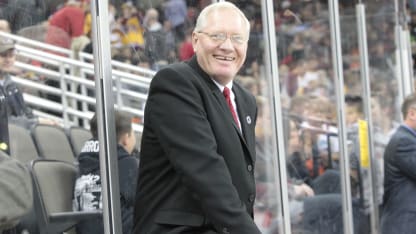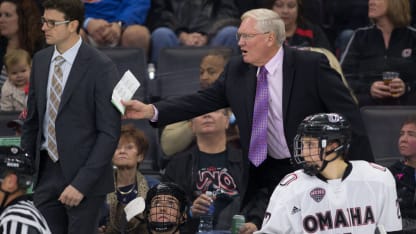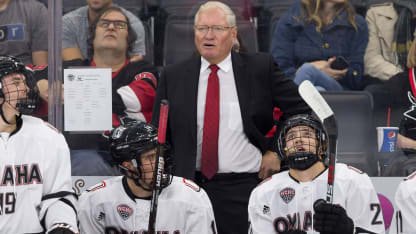Dean Blais said standing with his players on the blue line as the winning coach of the 2010 IIHF World Junior Championship, watching the American flag being raised during the playing of "The Star-Spangled Banner," is a moment he'll cherish forever.
Blais had long run of success as coach on way U.S. Hockey Hall of Fame
Four-decade career highlighted by winning 2010 World Junior Championship, two NCAA titles

The championship victory in Saskataoon, Saskatchewan, marked the first time the United States won a major men's international ice hockey tournament in Canada and is one of the high-water marks in his career. Another will come Thursday when he is inducted into the United States Hockey Hall of Fame as part of the Class of 2020 during a ceremony in Denver. (The Hall did not hold an induction ceremony in 2020 because of the Coronavirus pandemic, so the 2020 and 2021 honorees are being enshrined together.)
"Winning championships at (the University of) North Dakota was really special, and winning the Minnesota high school state championship in Roseau was too, but winning that gold medal was probably the biggest accomplishment," Blais said. "Canada had won five straight gold medals and it was on their home ground. We certainly weren't the favorite to go up there and win that gold medal."
New York Islanders forward Kyle Palmieri was part of that team and remembers it well.
"He got us to come together really fast, and when you get the opportunity to play for your country, you don't need to be too much of a motivator," Palmieri said. "He just wanted us to go out there and represent Team USA the best we could."
Blais had a four-decade career in coaching, including 19 seasons at North Dakota (nine as an assistant) and eight at the University of Nebraska Omaha, and helped inspire players at various levels to pursue their goals of when it came to playing or coaching.

The 70-year-old was influenced by two coaches he played for at the University of Minnesota from 1969-73: Glen Sonmor and Herb Brooks.
"Glen was the type of coach who allowed us to [play] shinny the whole practice, and when Herb came in my senior year, he would sometimes forget about shinny and have us skate the whole practice," Blais said. "Herb was all about being prepared, he was so organized."
Blais also remembers being in the right place at the right time.
"I remember walking by Herb's office (in '73). The door was open, and he said, 'Dean, get in here,'" Blais said. "He was watching this old tape of the Russians in 1973, showing me how they regrouped, how they were passing and some of the things they were doing that North American players weren't doing. He said, 'Someday I'm going to beat them.'
"I said, 'Yeah, sure Herb.' Who would have thought he would win three national championships at Minnesota and then win the gold medal (with the United States) at the [1980 Lake Placid Olympics]?"
Blais was the Golden Gophers rookie of the year in 1969-70 and scored 139 points (56 goals, 83 assists) in 124 career games at Minnesota. He was selected by the Chicago Black Hawks in the fifth round (No. 68) of the 1971 NHL Draft and played three seasons with Chicago's development team in Dallas before an injury ended his playing career.
Blais got his first coaching opportunity as a graduate assistant at Minnesota under Brooks in 1976-77.
"I was able to keep involved and transition into the coaching part of the game, so that was huge at the time," Blais said. "It was not uncommon for Herb to go over to the hotel where my parents stayed. We'd sit down, have a few drinks in the room with pizza and he'd go over power play and penalty kill. He was always coaching and watching over me."
Blais later was an assistant at North Dakota from 1980-89 under John "Gino" Gasparini.
"Dean was a good recruiter and a very demanding coach, much like me," Gasparini said.
One of those recruits was defenseman Brad Berry of St. Albert in the Alberta Junior Hockey League. Berry played three seasons at North Dakota (1983-86) and is in his seventh season as coach of the Fighting Hawks.
"Dean taught me about the accountable side," Berry said. "It didn't matter if you were a high-end player or middle-of-the-road player, it's whoever competed and played to their best capabilities got the big minutes. I think that kind of typifies our culture today."
Blais coached Roseau High School for two seasons (1989-91) and led the Rams to the Minnesota State High School League championship in 1990, when he was named the state coach of the year.
When Gasparini retired, Blais took over as coach at North Dakota in 1994-95.
A two-time winner of the Spencer Penrose Memorial Award as the NCAA Division I men's coach of the year, Blais guided North Dakota to NCAA Division I titles in 1997 and 2000; the Fighting Hawks were the runner-up in 2001. In his 19 seasons at North Dakota, the program produced 60 NHL draft picks, 28 All-Americans, three Western Collegiate Hockey Association players of the year, four league rookies of the year, 40 members of the All-WCHA team and 11 league all-rookie team selections.
"I think he's got that ability to get the best out of players, and there's a little bit of that intimidation factor in a good way where he can press the right buttons and get his guys to play hard and compete all over the ice," said Islanders forward Zach Parise, who played two seasons at North Dakota (2002-04). "He gave his offensive guys that freedom to create, so long as you're being responsible at both sides of the rink."
After three seasons as an assistant with the Columbus Blue Jackets (2004-07), Blais was coach and general manager of Fargo of the United States Hockey League in 2008-09; he was named USHL Coach of the Year that season, when Fargo won organization of the year honors.

He finished his coaching career at Nebraska Omaha in 2016-17, having guided the program to its first NCAA Frozen Four appearance in 2015 and two NCAA Tournament berths. Blais was 407-246-84 in 18 college seasons, including 14 winning seasons.
In addition to being coach for the United States at the 1994, 2010 and 2012 World Juniors, Blais was an assistant in 1988 and '89.
In the 2010 run, his team had five regulation wins, one overtime victory and one overtime loss before capping the tournament with a 6-5 overtime victory.
"It was fun to work with kids that believed you," Blais said. "I could talk to the team, could look in their eyes and see they were ready to go. We had a real good bunch of guys, and I think everything we said they tried to do. Maybe they couldn't do everything, but they certainly tried and were a lot of fun to coach."

















